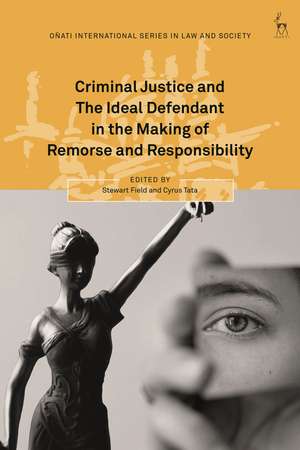Criminal Justice and The Ideal Defendant in the Making of Remorse and Responsibility: Oñati International Series in Law and Society
Editat de Stewart Field, Cyrus Tataen Limba Engleză Hardback – 17 mai 2023
Din seria Oñati International Series in Law and Society
- 22%
 Preț: 263.62 lei
Preț: 263.62 lei - 18%
 Preț: 310.25 lei
Preț: 310.25 lei -
 Preț: 473.76 lei
Preț: 473.76 lei - 19%
 Preț: 226.73 lei
Preț: 226.73 lei - 22%
 Preț: 265.10 lei
Preț: 265.10 lei - 28%
 Preț: 468.32 lei
Preț: 468.32 lei - 18%
 Preț: 359.44 lei
Preț: 359.44 lei - 30%
 Preț: 571.89 lei
Preț: 571.89 lei - 22%
 Preț: 262.89 lei
Preț: 262.89 lei - 22%
 Preț: 265.28 lei
Preț: 265.28 lei - 30%
 Preț: 568.40 lei
Preț: 568.40 lei - 30%
 Preț: 571.34 lei
Preț: 571.34 lei - 18%
 Preț: 322.41 lei
Preț: 322.41 lei - 14%
 Preț: 898.20 lei
Preț: 898.20 lei - 23%
 Preț: 194.50 lei
Preț: 194.50 lei - 22%
 Preț: 256.59 lei
Preț: 256.59 lei - 22%
 Preț: 266.39 lei
Preț: 266.39 lei - 30%
 Preț: 567.99 lei
Preț: 567.99 lei - 28%
 Preț: 499.08 lei
Preț: 499.08 lei - 30%
 Preț: 510.92 lei
Preț: 510.92 lei - 30%
 Preț: 572.47 lei
Preț: 572.47 lei - 19%
 Preț: 309.87 lei
Preț: 309.87 lei - 30%
 Preț: 570.02 lei
Preț: 570.02 lei - 17%
 Preț: 305.27 lei
Preț: 305.27 lei - 11%
 Preț: 280.78 lei
Preț: 280.78 lei - 21%
 Preț: 268.68 lei
Preț: 268.68 lei - 22%
 Preț: 257.41 lei
Preț: 257.41 lei - 18%
 Preț: 310.07 lei
Preț: 310.07 lei - 27%
 Preț: 502.12 lei
Preț: 502.12 lei - 30%
 Preț: 573.28 lei
Preț: 573.28 lei - 30%
 Preț: 577.76 lei
Preț: 577.76 lei - 22%
 Preț: 259.52 lei
Preț: 259.52 lei - 14%
 Preț: 774.62 lei
Preț: 774.62 lei - 30%
 Preț: 573.54 lei
Preț: 573.54 lei - 14%
 Preț: 574.51 lei
Preț: 574.51 lei - 14%
 Preț: 570.51 lei
Preț: 570.51 lei - 28%
 Preț: 468.48 lei
Preț: 468.48 lei - 22%
 Preț: 256.67 lei
Preț: 256.67 lei
Preț: 511.57 lei
Preț vechi: 731.87 lei
-30% Nou
Puncte Express: 767
Preț estimativ în valută:
97.90€ • 101.14$ • 81.48£
97.90€ • 101.14$ • 81.48£
Carte tipărită la comandă
Livrare economică 25 martie-08 aprilie
Preluare comenzi: 021 569.72.76
Specificații
ISBN-13: 9781509939916
ISBN-10: 1509939911
Pagini: 336
Dimensiuni: 156 x 234 x 23 mm
Greutate: 0.57 kg
Editura: Bloomsbury Publishing
Colecția Hart Publishing
Seria Oñati International Series in Law and Society
Locul publicării:London, United Kingdom
ISBN-10: 1509939911
Pagini: 336
Dimensiuni: 156 x 234 x 23 mm
Greutate: 0.57 kg
Editura: Bloomsbury Publishing
Colecția Hart Publishing
Seria Oñati International Series in Law and Society
Locul publicării:London, United Kingdom
Caracteristici
Addresses the significance of expressing remorse and accepting responsibility to the classification and 'normalisation' of defendants in the criminal justice process
Notă biografică
Stewart Field is Professor of Law at the School of Law and Politics at Cardiff University, UK. Cyrus Tata is Professor of Law and Criminal Justice at Strathclyde University Law School, UK, where he is director of the Centre for Law, Crime & Justice.
Cuprins
Part 1: The Making of Remorse and Responsibility 1. Locating the Ideal Defendant: Punishment, Violence and LegitimacyStewart Field and Cyrus Tata 2. Remorse in the French Criminal Justice System: A Subterranean InfluenceVirginie Gautron 3. Constructing remorse: Interactional dimensions of finding an emotionSharyn Roach Anleu and Kathy Mack 4. Constructing Ideal Defendants in the Pre-Sentence Phase: The Connection Between Responsibility and Potential RemorseLouise Victoria Johansen 5. The Paradoxical Uses of 'Culture' in Judicial Assessment of Defendant Demeanour and Remorse. Irene Van Oorschot 6. Cultural Sensitivity Training, Judicial Feelings, and Everyday Practice: Conversations at the edge of researchKate Rossmanith Part 2: Beyond Remorse 7. Remorse is Not Enough: Disentangling the Roles of Remorse and Insight in the Construction of the Ideal DefendantRichard Weisman 8. The Construction of the Ideal Defendant: Comparative Understandings of the Normalisation of Guilt Jacqueline S. Hodgson 9. Looking for the Ideal Parole Applicant?Nicola Padfield Part 3: The Political and Cultural Significance of Remorse and Responsibility 10. The Enactment of Political Cultures in Criminal Court Process: Remorse, Responsibility and the Unique Individual Before the French cours d'assisesStewart Field 11. Punishment and the 'Blind Symbiosis' of Legal and Rehabilitation Work in the Making of the 'Ideal' DefendantCyrus Tata 12. Remorse and Restoration: The Role of Remorse in Constructing the 'Ideal Offender' of Restorative JusticeGiuseppe Maglione
Recenzii
Criminal Justice and The Ideal Defendant is a dazzling contribution. It takes the debate in important new directions, and poses a powerful challenge to conventional wisdom.
Criminal Justice & The Ideal Defendant originates new research agendas and fresh perspectives on the key problem of remorse and responsibility.
This fascinating volume reveals the complex role of emotions in criminal justice; a topic that requires and deserves our urgent attention, if we are to find our way towards more honest and more just systems and practices.
Stewart Field and Cyrus Tata have brought together leading scholars from a range of disciplines to explore the crucial puzzle that is 'the ideal defendant.' This is the ideal collection on the ideal defendant.
Criminal Justice & The Ideal Defendant originates new research agendas and fresh perspectives on the key problem of remorse and responsibility.
This fascinating volume reveals the complex role of emotions in criminal justice; a topic that requires and deserves our urgent attention, if we are to find our way towards more honest and more just systems and practices.
Stewart Field and Cyrus Tata have brought together leading scholars from a range of disciplines to explore the crucial puzzle that is 'the ideal defendant.' This is the ideal collection on the ideal defendant.
